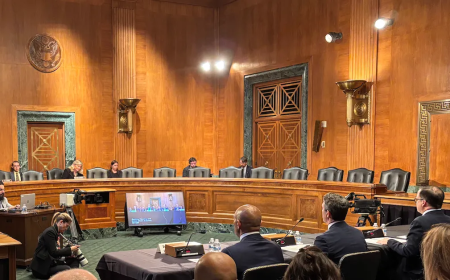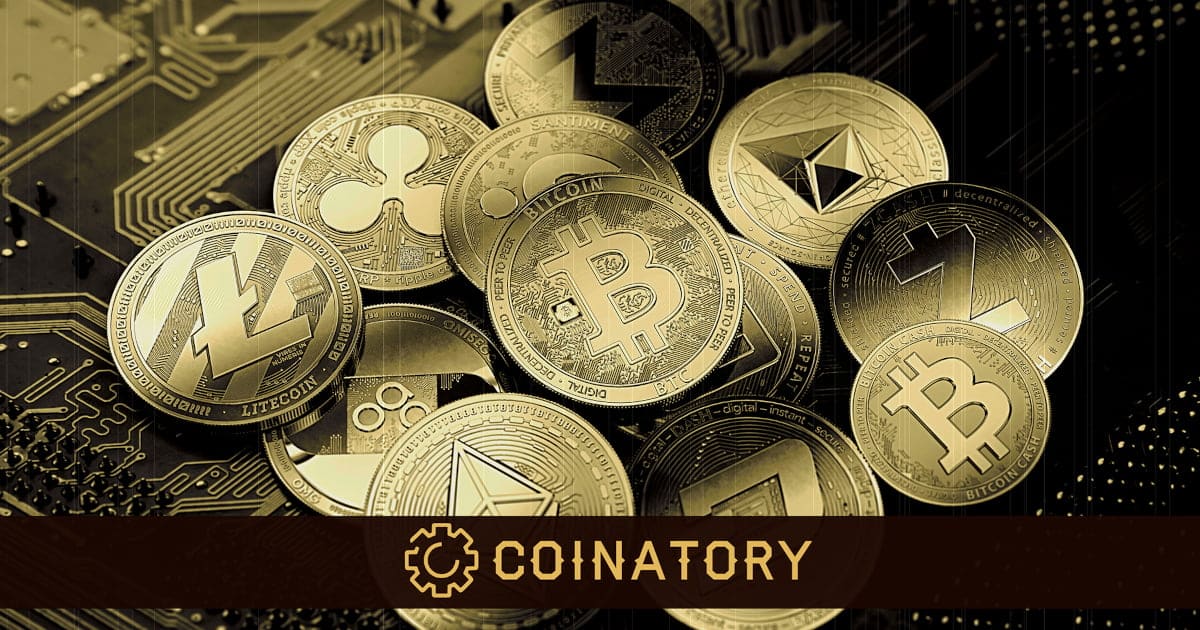How Can Crypto Function Without the Internet?
Cryptocurrencies and the internet are inextricably linked, with digital assets relying on the web’s infrastructure for secure transactions and blockchain integrity. Concerns have arisen about global internet blackouts caused by government actions. In such a scenario, the viability of cryptocurrencies functioning without the internet becomes a pressing question. This Cryptopolitan guide explores the crucial connection […]

Cryptocurrencies and the internet are inextricably linked, with digital assets relying on the web’s infrastructure for secure transactions and blockchain integrity. Concerns have arisen about global internet blackouts caused by government actions. In such a scenario, the viability of cryptocurrencies functioning without the internet becomes a pressing question.
This Cryptopolitan guide explores the crucial connection between cryptocurrencies and the internet, potential causes for global internet shutdowns, and whether crypto functions without internet access. As digital currencies gain prominence, understanding their resilience in the face of an internet blackout becomes increasingly important for the future of finance.
The foundational role of the Internet in crypto
Cryptocurrencies emerged as a natural extension of the internet, embodying the principles of decentralization and facilitating borderless transactions. The internet, acting as the scaffolding upon which cryptocurrency systems are constructed, has been instrumental in their proliferation.
Cryptocurrencies represent a digital form of currency that can transcend geographical boundaries. This very concept aligns seamlessly with the internet’s core ethos of connectivity and globalization. The internet serves as the conduit through which cryptocurrency transactions occur, enabling individuals from different corners of the world to engage in peer-to-peer exchanges without intermediaries.
Blockchain technology and internet dependence
Blockchain technology, underpinning cryptocurrencies like Bitcoin, operates as a distributed ledger that meticulously records every transaction made within the network. These transactions are validated by a network of nodes, geographically dispersed across the globe. However, the crucial element enabling these nodes to communicate and validate transactions is the internet.
The decentralized nature of blockchain technology means that no single entity has exclusive control over the network. Instead, it relies on a consensus mechanism among the nodes to maintain the integrity of the ledger. This consensus mechanism involves nodes independently verifying and agreeing upon the validity of transactions.
In this intricate web of trustless transactions, the internet plays a pivotal role in ensuring that nodes can communicate seamlessly. Each node must have access to the internet to receive and broadcast transaction information to its peers. Without this global network of interconnected nodes facilitated by the internet, the entire trustless system that cryptocurrencies depend on would crumble.
Blockchain and global network
The global network of nodes that operate on the blockchain ensures several critical attributes of cryptocurrency transactions. Blockchain guarantees transparency, as every transaction is publicly recorded on the blockchain, visible to anyone interested.
It contributes to security, as the distributed nature of the ledger makes it resistant to tampering or hacking attempts.
It upholds immutability, as once a transaction is recorded on the blockchain, it becomes a permanent part of the ledger and cannot be altered.
This interconnected network of nodes allows for direct, peer-to-peer transfers of digital assets. When a cryptocurrency user initiates a transaction, the information is broadcast across the network, and nodes work collectively to validate and add the transaction to the blockchain. This process occurs without reliance on intermediaries, such as banks or payment processors.
What would happen to crypto if there was no internet?
While a complete global internet blackout is highly improbable, governments have demonstrated the ability to shut down the internet within their jurisdictions for various reasons. Such localized shutdowns have had severe economic consequences and highlight the vulnerability of cryptocurrencies in the absence of the internet.
A global internet blackout would bring cryptocurrencies to a standstill. Cryptocurrency transactions, which rely on the internet to confirm and record new transactions on the blockchain, would be impossible to execute. The decentralized nature of cryptocurrencies necessitates a globally coordinated effort via the internet to mine new blocks and maintain the integrity of the blockchain.
Some cryptocurrencies might exhibit short-term resilience without the internet, provided alternative technologies can facilitate global connectivity and coherence. For instance, Bitcoin transactions could potentially continue if transaction data could reach the blockchain, regardless of the means used.
Potential technologies that could power crypto transactions
SMS-Based Transactions
Short Messaging Services (SMS) have emerged as a promising avenue for facilitating cryptocurrency transactions, particularly in regions where conventional internet access is limited. This innovative approach enables users to initiate cryptocurrency transactions using standard text messages, with subsequent confirmation and recording of these transactions on the blockchain facilitated through connected services.
The mechanism behind SMS-based cryptocurrency transactions is straightforward. A user composes an SMS containing the necessary transaction details, which is then sent to a designated service provider. This service provider acts as an intermediary, bridging the gap between the user and the blockchain network. Upon receiving the SMS, the service provider validates the transaction and subsequently broadcasts it to the blockchain on behalf of the user. Once confirmed, the transaction is permanently etched into the blockchain’s immutable ledger.
One notable example of SMS-based cryptocurrency solutions is Machankura, which has been instrumental in empowering individuals in Africa facing internet connectivity challenges to participate in Bitcoin transactions. Through Machankura, users can seamlessly send and receive Bitcoin using SMS, effectively bypassing the limitations of unreliable or absent internet access.
While SMS-based transactions offer a potential workaround in situations where traditional internet connectivity is unreliable or unavailable, they are not without their limitations. Transaction processing speed and dependence on intermediaries for validation remain areas of concern that need to be addressed to enhance the viability of SMS-based cryptocurrency transactions.
Satellite-based transactions
Satellite-based technology presents an alternative means of transmitting cryptocurrency transactions, particularly valuable in remote and underserved areas where internet connectivity remains a challenge. In this approach, users utilize specialized satellite receivers to facilitate the processing and recording of cryptocurrency transactions on the blockchain.
Blockstream, a prominent player in the cryptocurrency space, has spearheaded the implementation of satellite-based cryptocurrency transactions. This innovative technology allows users to send and receive Bitcoin transactions via satellite signals, effectively eliminating the need for traditional internet access.
The mechanics of satellite-based cryptocurrency transactions are grounded in the transmission of transaction data to satellites orbiting the Earth. These satellites, in turn, relay the data to ground stations that are seamlessly integrated into the blockchain network. Once a transaction is confirmed, it becomes a permanent part of the blockchain ledger.
Satellite-based transactions not only offer a lifeline to users in remote locations but also enhance the overall resilience of cryptocurrencies by diversifying the means of connectivity. However, challenges such as the initial cost of satellite receivers and the need for specialized infrastructure must be addressed to make satellite-based transactions more accessible and cost-effective for a broader user base.
Radio-powered transactions
Radio technology represents another intriguing option for sustaining cryptocurrency transactions in scenarios where the traditional internet infrastructure is unreliable or deliberately disrupted. In a noteworthy experiment conducted in 2019, two Bitcoin developers successfully demonstrated the feasibility of processing Bitcoin lightning payments using radio waves. This innovative response was designed to counteract potential censorship and showcased the adaptability of cryptocurrencies.
The concept underpinning radio-powered cryptocurrency transactions involves the use of radio waves to broadcast transaction data between users and nodes within a meshed radio network. Transactions are validated and added to the blockchain ledger, mirroring the conventional process observed in internet-based transactions.
While radio-powered transactions offer a means of resilience against internet disruptions, they are not devoid of limitations. The technology tends to be comparatively slower in transaction processing when juxtaposed with traditional internet-based methods. Moreover, specialized radio equipment is imperative for both broadcasting and receiving transactions, and the cost and accessibility of such equipment pose inherent challenges that necessitate further refinement and accessibility improvements.
Challenges of using alternative technologies
Internet dependency for recording and mining
Alternative technologies have shown promise in enabling cryptocurrency transactions without traditional internet access. However, a critical challenge lies in the internet’s continued dependence for recording transactions and performing mining activities. Even though these technologies can initiate and transmit transactions via unconventional means, they invariably rely on the internet to record these transactions on the blockchain and facilitate the essential mining process.
In a scenario of a complete internet blackout, where the global network is entirely inaccessible, alternative technologies may struggle to coordinate the recording of transactions and the addition of new blocks to the blockchain. This poses a formidable obstacle to the seamless operation of cryptocurrencies, as the lack of a unified internet connection disrupts the essential consensus mechanisms and validation processes that cryptocurrencies rely upon.
Fragmentation of the Blockchain
The absence of a global internet connection in an environment heavily reliant on alternative technologies would lead to a fragmented blockchain landscape. Each disconnected network or node would possess its own isolated copy of the blockchain, divorced from the broader network of nodes. This fragmentation engenders several challenges, primarily concerning transaction reconciliation and blockchain maintenance.
Transactions initiated within one fragmented network may not be easily translatable or recognized by other isolated nodes. Maintaining a single, functional blockchain becomes a formidable task. In such a fragmented environment, the risk of certain transactions being discarded during the block addition process amplifies, as different segments of the blockchain may fail to synchronize with each other.
Technical limitations
While alternative technologies offer innovative solutions to circumvent internet dependency for cryptocurrency transactions, they carry their own set of technical limitations. These limitations have significant implications for transaction speed, cost, and reliability, potentially affecting the overall user experience.
For instance, radio-powered transactions, while showcasing promise, exhibit significant drawbacks. They tend to be notably slower compared to traditional internet-based transactions, which can hinder the speed and efficiency of cryptocurrency transactions. Additionally, the requirement for specialized radio receivers introduces accessibility challenges, as the cost and availability of such equipment may limit their widespread adoption.
The need for internet-independent crypto
Unlikelihood of a global internet shutdown
The complete shutdown of the global internet is an event of exceedingly low probability, given the pervasive reliance on the internet for myriad aspects of modern life, including communication, commerce, and information exchange. The intricate web of global connectivity makes a simultaneous and total blackout a near-impossible occurrence.
However, the need to contemplate scenarios where governments censor or restrict internet access for various reasons is paramount. Instances of localized internet shutdowns, while not encompassing the entire globe, have demonstrated the potential for digital communication disruptions. These localized incidents underline the necessity of developing robust, internet-independent solutions for the cryptocurrency ecosystem.
Importance of innovation in crypto
The cryptocurrency development community assumes a central role in addressing the imperative for internet-independent crypto solutions. While the internet remains robust, it is indispensable to allocate resources towards research and development endeavors that fortify the cryptocurrency landscape against unforeseen challenges, including internet disruptions.
Innovations in the cryptocurrency domain should extend beyond the digital realm and explore alternative technologies and methods that enhance resilience. The ability to adapt to adverse circumstances is paramount. This proactive approach ensures that the fundamental benefits of cryptocurrencies, such as decentralized financial inclusivity and sovereignty, are upheld even in scenarios where internet access is compromised.
Ensuring financial inclusivity and sovereignty
Cryptocurrencies harbor the potential to revolutionize financial systems by affording individuals greater control and financial sovereignty. However, this promise can only be fully realized if cryptocurrencies are capable of functioning independently of the internet.
Developing internet-independent crypto systems aligns with the ethos of financial inclusivity, enabling individuals in regions with limited or censored internet access to participate in the global economy. It safeguards against the concentration of financial power in centralized institutions and governments, reinforcing the principle of individual financial sovereignty—a cornerstone of the cryptocurrency movement.
Conclusion
The undeniable symbiotic relationship between cryptocurrencies and the internet, with the internet serving as the backbone of blockchain technology, highlights the need to explore alternative transaction technologies. While a global internet blackout is highly improbable, it emphasizes the importance of innovations like SMS-based, satellite-based, and radio-powered transactions.
However, these solutions come with their challenges, including internet dependencies and technical limitations. The pursuit of internet-independent cryptocurrency systems is not just a precautionary measure, but a means to enhance financial inclusivity and sovereignty in an increasingly digital world. The unwavering commitment of the cryptocurrency community to innovation is pivotal in addressing these challenges and securing the future of digital finance.
What's Your Reaction?




































































































